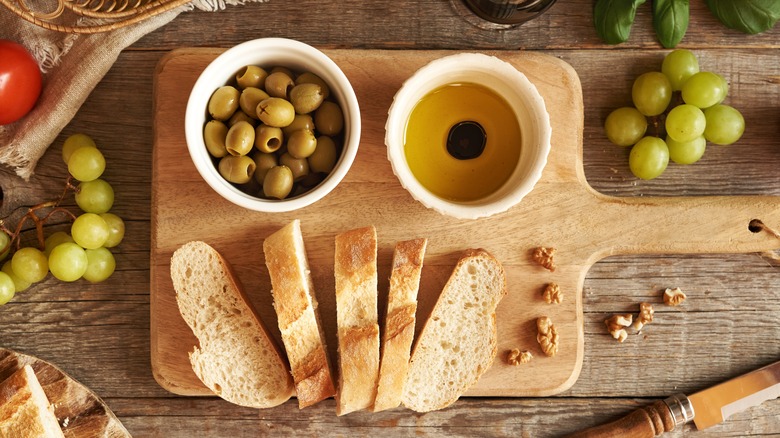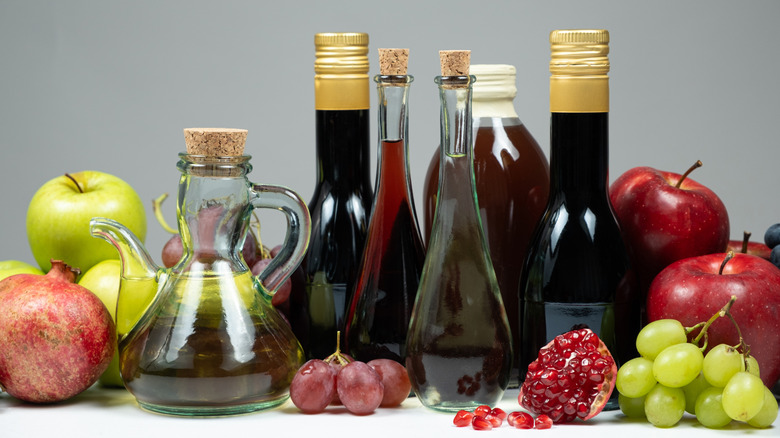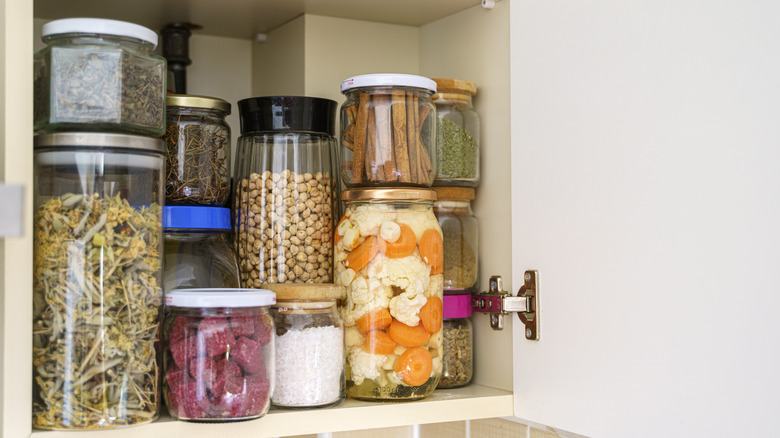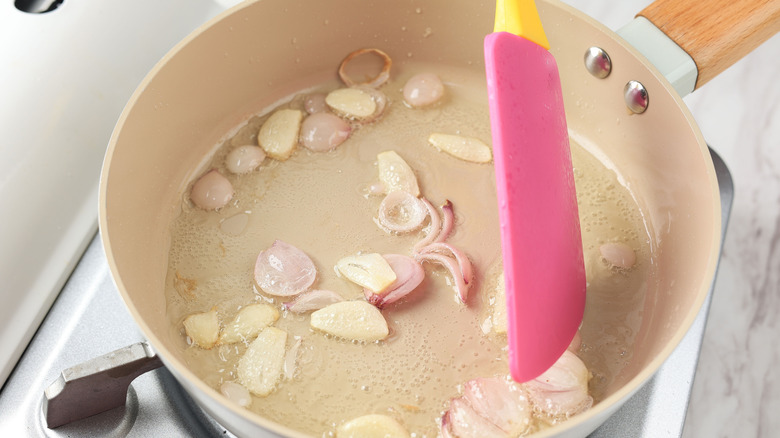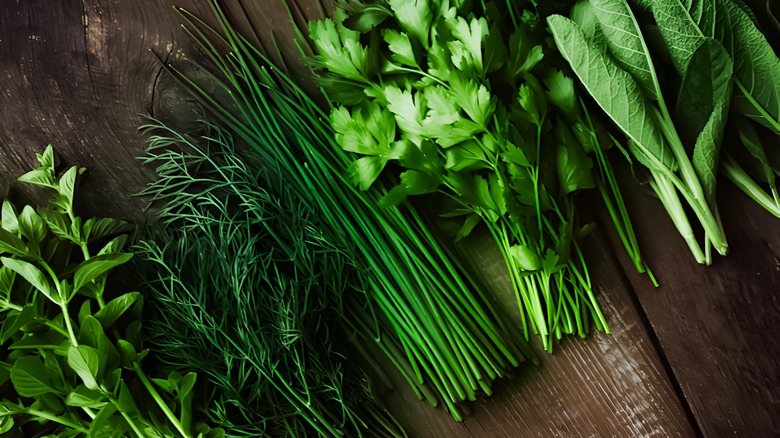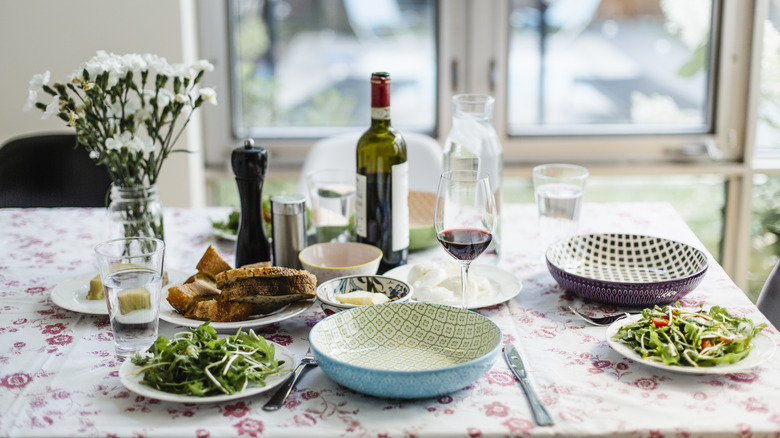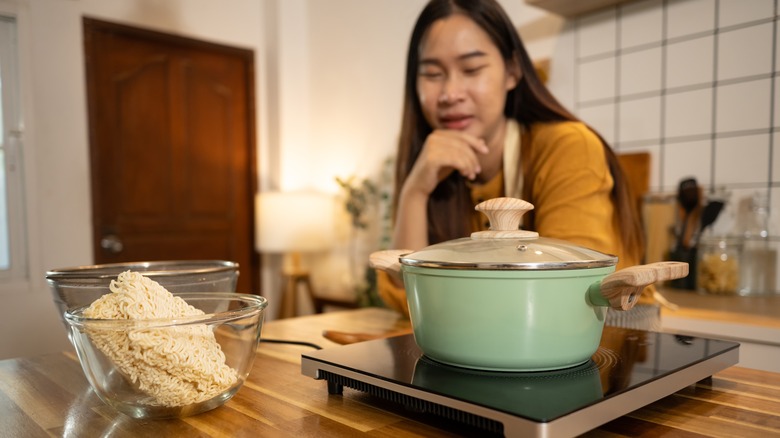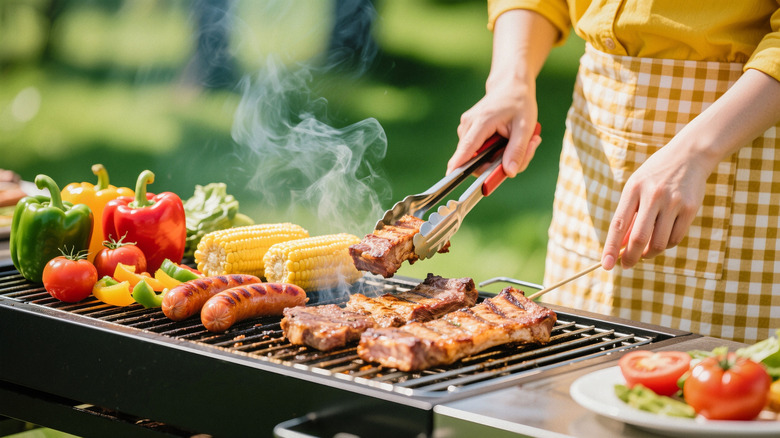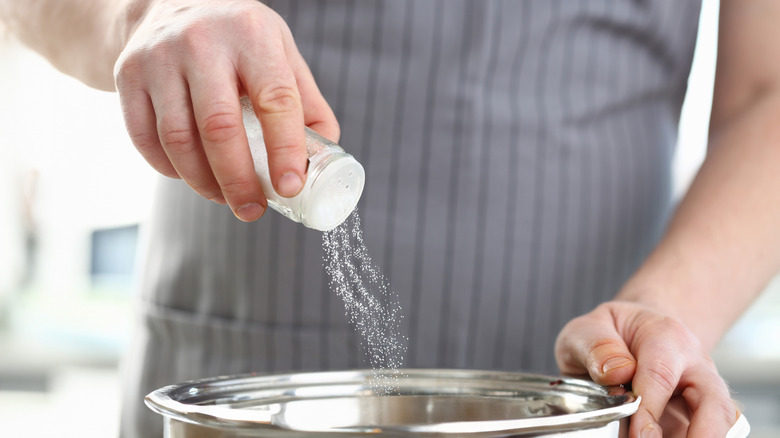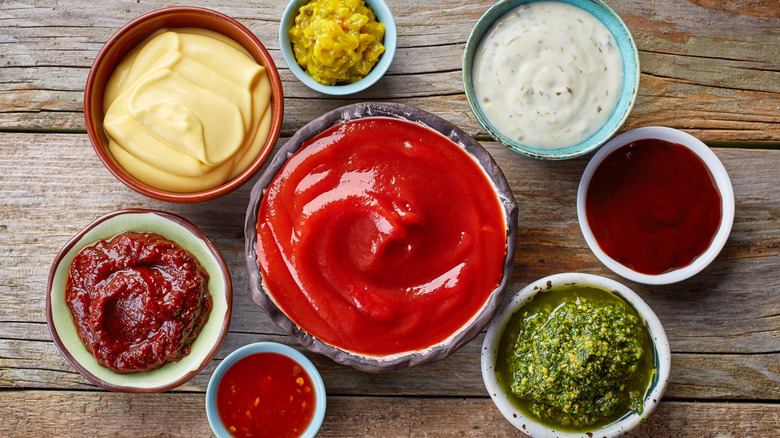We Asked Pro Chefs How To Instantly Upgrade Your Weeknight Dinners
For most of us, weeknight dinners signify drudgery and boredom. Tired of the same-old, same-old, we tend to resort to last-minute takeouts or bland meals thrown together with little thought. Surely, there's a better way? In search of a few clever (and replicable) tricks that could transform simple daily dinners into restaurant-worthy meals, we reached out to four pro chefs to share their secrets.
Our panel of experts includes Culinary Director Dustin Lewandowski from Wolfgang Puck Fine Dining Group, who has spent decades shaping some of Las Vegas and California's most celebrated kitchens. Chef Troy Guard, born and raised in Hawaii, has cooked across Asia, New York, and Denver, where he now runs the acclaimed TAG Restaurant Group. Chef Nicholas Webber, co-founder of Michelin-listed 24 Suns in San Diego, combines classical French training with bold, umami-packed Chinese flavors, and Chef Jacinto Perez helms Constantino's Pasta Bowls in Greenwich, Connecticut, blending family recipes with professional techniques to create accessible Italian comfort food with a gourmet twist.
From mastering culinary techniques to prepping ahead, avoiding common mistakes, to ramping up the flavor in surprising ways, these chefs reveal some of the best tools and tricks to make your weeknight dinners something to look forward to.
Start with the best basics
A good meal doesn't have to be overly complicated or made up of multiple ingredients. As our experts explain, sometimes, the best weekday meals can come together in a matter of minutes when you start with high-quality basics. The key is building an arsenal of essentials that fit within your budget and suit your palate.
Sometimes all it takes is a great loaf of bread paired with some artisanal cheese and a nice bottle of wine, and your dinner, according to Chef Dustin Lewandowski, is sorted. Stocking your pantry with classic, simple ingredients can make a world of difference when used correctly. For Chef Jacinto Perez, this ingredient is olive oil. He urges everyone to invest in a good extra virgin olive oil. Then all you need to do is drizzle the oil over a pasta or soup to deepen the flavors and add a sophisticated touch to an everyday meal. Using a superior olive oil as a dipping sauce for bread is another easy recipe hack to tide you over until your main course is ready.
Our experts are firm believers that it's not always about show-stopper ingredients. For Chef Troy Guard, it's the power of the little things that can make all the difference. "Salt, lemon, soy sauce, sriracha, butter, and Lao Gan Ma Chili Crisp. I use those every single day. They're my go-tos for just about everything."
The power of acid and umami
Everyone talks about salt being the foundation of good cooking, but our chefs want you to know that it's acid and umami that truly bring meals to life. Magic can happen with just a splash of vinegar or a squeeze of citrus. If you want to transform even the simplest of weekday cooking, learn to harness these flavors, and your meals will never taste the same again.
Chef Troy Guard swears by bold, flavor-packed shortcuts: "Vinegars, soy sauce, anything that's umami-packed or has a little spice. And my guilty secret that I never tell anyone? Newman's Own Zesty Italian dressing ... it's amazing." For Chef Jacinto Perez, it's all about a hidden powerhouse, "The most underrated ingredient I always keep at home is anchovy paste. A tiny squeeze melts into sauces, dressings, or sautés and instantly adds depth and umami without making the dish taste fishy ... Most people overlook it, but once you start using it, you realize it's magic!"
Chef Nicholas Webber looks to fermentation for maximum impact. "Fermented Ingredients, especially bean pastes like misos or all of the Korean 'jangs' for some of these ingredients, years have already been put into them, building flavor and intensity. My favorite is Doubanjiang, a spicy fermented broad bean paste from China." And Chef Dustin Lewandowski reminds us not to overlook acidity's balancing act and highlights that vinegars and acids can be nearly as vital as salt when it comes to bringing out flavors.
Underrated staples you need in your pantry
For most of us, a well-stocked pantry typically includes staples such as rice, oil, pasta, and a variety of canned foods. And while these unsung heroes can do a good job of rounding off your daily meals, other versatile staples don't always get the spotlight. However, once you know how and when to use them, they can take your home-cooked meals to the next level.
Chef Dustin Lewandowski champions the vinaigrette as a secret weapon. Lewandowski explained that mastering the basic balance of vinegar, oil, and seasonings can lead you to experimenting with different vinegars and flavors, and open the door to several exciting recipes and cuisines. Making that leap from believing that vinaigrettes are only for salads to using them to enhance vegetable dishes, jazz up cold noodles, and even transform proteins, will significantly expand your daily meal repertoire.
For Chef Nicholas Webber, the ultimate multitasker is chimichurri. "A good chimichurri is super versatile and will always please. Works great on steak, of course, but can also dress salads, breads, toss cooked vegetables in it, instantly make that herbaceous, garlicky brightness that is often missing at home." Always have one in your fridge, and you will never run out of ways to use it. Spread it on sandwiches, stir it into a warm grain bowl, or just use it as a dipping sauce for steak. Chimichurri is one of those sauces that makes whatever you are cooking up taste immediately complex and multi-layered.
How to build flavor easily
Our panel of experts shows us that building flavorful meals doesn't always have to involve sauces simmering for hours or roasting meat till it falls off the bone. In fact, with some simple culinary techniques and a few multi-tasking ingredients, you can take a basic dish and make it taste and look like you have been working in the kitchen all day.
For Chef Jacinto Perez, it all starts with the proper foundation. He insists on layering aromatics right at the start. When you begin with a sauté of garlic, onions, or shallots in olive oil, you build an instant base of flavor. Deglazing the pan with a splash of wine, broth, or even pasta water will help lift all those delicious caramelized bits, while a pinch of chili flakes, fresh herbs, or lemon zest at the end adds brightness and complexity.
Chef Dustin Lewandowski keeps it straightforward and smoky: "Throw it on the grill! When short on time, I find a quick marinade for meat, chicken, or fish goes a long way. The marinade will caramelize nicely over the heat, and the coals will impart a light smoky flavor as well." Other times, it's the small finishing touches that have the most impact. Chef Troy Guard swears by adding butter, vinegar, fresh herbs, or fresh lemon juice. Along with fresh produce, you can create a dish that feels fresh and more complete.
How to upgrade store-bought ingredients
Even the best store-bought sauces, soups, or pastas can feel meh on their own. The chefs we spoke to, however, know a few tricks of the trade to vary the tastes and flavors of these convenience items with a few easy add-ons. Chef Dustin Lewandowski finds that "You can really brighten up the flavor of premade ingredients by adding some fragrant fresh herbs. Whether it's adding some fresh torn basil and chili flakes to a jar of tomato sauce or some chopped parsley, thyme, and dill to a chicken soup. The dish becomes more fragrant and aromatic, and pops with some added color for garnish as well."
Chef Nicholas Webber emphasizes building flavor from the get-go. Take the time to heat the oil and sweat your aromatics like garlic and onions before building up a sauce. Once this foundation level is mastered, adding on brighter ingredients like tomatoes and herbs takes no time at all. He also points out that a splash of soy sauce can be transformative — even if you are not cooking an Asian meal. Try a dash in your pasta sauce the next time you are cooking and mark the difference. Chef Jacinto Perez concurs, "Adding wow factor doesn't have to be complicated; it's all in the finishing touches. A sprinkle of fresh herbs like parsley or basil can add freshness." They aren't complicated tricks but can elevate store-bought stuff to restaurant-worthy flavor.
Restaurant-worthy finishing touches
Whether you've slaved over a recipe for hours or thrown together something in a matter of minutes, it's the final details that can take a dish from regular to unforgettable. For Chef Nicholas Webber, "everything in a dish should have function ... slice scallions on a deep bias as thin as you can and dunk into a container of very iced water. Leave for 30 minutes and pull them out to dry, and they will be curly little messes that can lend a crisp garnish and height to any plate." Voila, a dish that looks as good as it tastes.
For Chef Dustin Lewandowski, finishing touches also refer to the power of desserts as the final flourish to a home-cooked meal. He reiterates that it doesn't have to be something fancy or complicated. A simple fruit cobbler or crumble made with whatever fruit is fresh and in season hits the perfect spot. Think peaches, plums, apples, or berries tossed with butter and sugar and warmed just before serving. If you want to take it a step further, serve it with a puff of whipped cream or a scoop of ice cream, and you have a dessert that feels thoughtful and satisfying. A reminder that ending a meal on a sweet note doesn't mean fancy pastry-making skills or baking expertise. Sometimes it's the simplest ingredients served with just a little bit of care that rounds up the evening in the most enjoyable way.
Go-to 20 minute meals
Looking for a quick weekday meal that calls for speed but without sacrificing any flavor? Our chefs have your back! Chef Nicholas Webber swears by loaded, hearty salads, but not the kind that leave you hungry an hour later. Instead, he recommends roasted vegetables along with grilled chicken or any protein of your choice, layered with something crunchy like crispy wonton strips or classic croutons. What you end up with is a salad that feels like a complete meal and never gets boring. Chef Dustin Lewandowski relies on a few pantry essentials to build fast, restaurant-worthy pasta: "Keeping some quality dry pasta, a can of San Marzano tomatoes, and some aged Parmesan Reggiano at hand can be the start of a quick and simple meal. You can easily elevate this by adding some pancetta or Italian sausage."
On the other hand, Chef Troy Guard focuses on convenience and adaptability. For him, instant ramen is his go-to when he's in a weekday dining slump. But unsurprisingly, he uses the standard ramen as his blank canvas, upgrading the bowl of noodles with fresh vegetables, a jammy boiled egg, and a drizzle of chili crisp to round things off. He's also enthusiastic about eggs in all their varied avatars. From scrambles to omelets, he advises us to bulk them up with cheese or extra veggies and wrap them up in tortillas for an easy and satisfying weeknight fix.
Learn these techniques to transform everyday cooking
Some techniques are worth mastering. Whether it's cast braising or grilling over charcoal, our experts assure us that by learning these tricks of the trade, everyday cooking can turn into something extraordinary. For Chef Jacinto Perez, finishing off the dish with heat is a foolproof technique to elevate even the simplest dish.
Instead of simply spooning your sauce on top of boiled pasta, toss everything together in a hot pan and cook for a few minutes to meld all the flavors and allow the sauce to cling beautifully. No matter whether it's a speedy sear on a grill, a flash under a broiler, or even a theatrical flambé, those final moments of cooking are where the magic happens. Chef Troy Guard agrees, but with a small caveat. He brings the technique indoors. For him, grilling is the ultimate taste booster. "Gas grills are super convenient and fast, but if you've got a few extra minutes, cooking over charcoal or wood takes it to another level."
Chef Nicholas Webber, meanwhile, champions pickling as a way to add brightness and versatility. He urges us to "Pickle lots of vegetables! Pickle them with different ingredients and spices, and flavors, so you always have one for the right dish. They don't need to be huge chunks of cucumber; pickle some thin-sliced carrots for garnishing. Pickled onions go great on so many things. A super acidic bright pop will help balance any savory or fatty dish."
Avoid these common mistakes
No matter how experienced a home cook you are, there are common pitfalls that tend to compromise flavor and texture. If you want your weeknight dinners to shine, there are some classic mistakes to watch out for. According to Chef Troy Guard, the biggest issue home cooks face is overcooking. "It happens to everybody ... but you can always repurpose. Dry steak? Chop it up and add it to stir fry, ramen, or a quesadilla, and you just saved it. The key is not being married to the original idea and being open to pivoting to something else."
Chef Nicholas Webber reminds us that one of the most overlooked steps in home cooking is also one that has the biggest impact. Tasting food as you cook and seasoning at every stage is imperative. It's easy to get caught up in the recipe and blindly follow the instructions. However, good cooking is also about responding and adjusting as needed. If your soup feels flat, a pinch of salt or a squeeze of lemon can remedy the situation. If the salad dressing lacks pizzazz, an added splash of vinegar or a bit of sugar could save the day. Experienced chefs know that even when cooking the same recipe day after day, a few unplanned tweaks may be needed along the way. When you trust your palate and make the changes required, your good dish becomes a great one.
The power of prep
A little preparation goes a long way in making daily cooking easier, faster, and more enjoyable. Chef Nicholas Webber explains, "Have a fridge and cabinet full of good stuff! My first mentor told me, 'Run now, so you don't have to run later!'. Being able to have things like sauces, or garlic oil, or preserved lemon, good stock ... having all that handy makes walking in to whip something quick a lot easier." Chef Dustin Lewandowski agrees wholeheartedly. "Mise en Place. It's not really a trick but a rule. If you stay organized and have everything prepped and ready before you start cooking, you will save yourself a headache throughout the process." This allows you to focus on the actual cooking rather than searching through the cupboards for ingredients. Not to mention, it makes cleanup as you go faster.
Chef Troy Guard is a fan of cooking ahead, especially when it comes to family favorites such as meatloaf, chili, lasagna, and even baked potatoes. These meals don't just freeze and reheat well — they, in fact, get better with time. Meatloaf firms up and slices more easily, lasagna acquires a depth of flavor, and even a simple baked potato, made ahead, can be a lifesaver on a busy weekday night. Guard's philosophy is simple: When you take the time to prepare ahead you save yourself stress but with meals like these, your dinners taste even better.
One sauce every home cook should master
Experts believe that a versatile sauce can make all the difference to your cooking prowess. Adding easily available and adaptable condiments can bring out the flavor and brightness of a humdrum recipe and can add a professional touch to your meal. Even when time is limited, mastering these sauces can transform a simple dish into something comforting and restaurant-quality.
As Chef Jacinto Perez puts it, "If I only had 20 minutes at home, I'd keep it simple but satisfying. I'd probably make a quick pasta, something like spaghetti aglio e olio. It's just garlic, olive oil, a touch of chili flakes, and fresh parsley. It's fast, but it's layered with flavor and feels special. I'd finish it with Parmesan and maybe a squeeze of lemon."
Meanwhile, Chef Troy Guard champions the power of a foundational culinary sauce to elevate almost any meal. His go-to that he recommends everyone master is the beurre blanc. A beurre blanc is a sauce made from just white wine, vinegar, shallots, butter, and salt, but it packs a punch in terms of flavor. Its versatile base can be easily adapted to all types of dishes. From chicken to steak, fish to vegetables, a few added seasonings and herbs can make everyday meals feel sophisticated and unforgettable.

